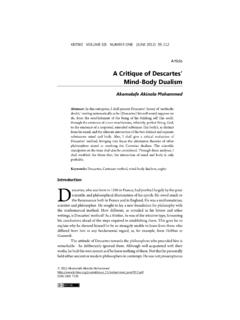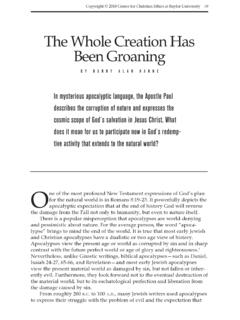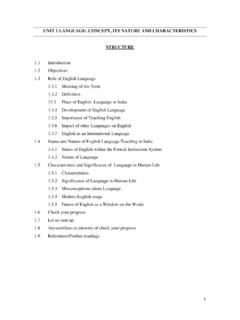Transcription of The Notions of the Human Person and Human Dignity in ...
1 KRITIKE VOLUME THREE NUMBER ONE (JUNE 2009) 40-60 2009 Jove Jim S. Aguas ISSN 1908-7330 Article The Notions of the Human Person and Human Dignity in Aquinas and Wojtyla Jove Jim S. Aguas I. Introduction t the center of the various transformations and advancements in modern society is man. It is man by whom and for whom these transformations and advancements are made. But one negative factor accompanying these transformations is the violence or the degradation of the Human Person and his Dignity , more alarming is the violence committed by man against his fellow man. Today, there is so much violence in the world, everyday we hear about killings, kidnappings, rapes, abortion, terrorist attacks, hunger, wars and many other acts of violence.
2 It is ironic that, while the Human Person is the very victim of this violence, it is also the Human Person who is the perpetrator of such violence, man is simultaneously the victim and the culprit. Man indeed is a paradox, for while he is bestowed with Dignity and good nature, he is also capable of doing evil and inflicting harm against others. This violent tendency happens because man fails to acknowledge the very Dignity of his nature which is rooted in his fundamental relation with God and extended to his fellow Human beings. Man is by nature good, but he is also capable of doing evil things. The Catholic Church through its teachings and writings have always emphasized the value of the Person , while at the same time acknowledging the fact that he is as much capable of degrading himself.
3 The Pastoral Constitution of the Church in the Modern World, Gaudium et Spes acknowledges the many divergent and contradicting opinions of man about himself, one of which exalts man as the absolute measure of all things and debases himself to the point of despair. The result is doubt and anxiety. 1 But let us focus on the brighter side of man, his Dignity as a Person . The Gaudium et Spes, quoting the Scriptures, stresses that man was created in the image of God and that he is capable of knowing and loving his Creator. He was appointed by God to be the master of all earthly creatures; was made little less than the angels and crowned him with glory and Indeed man is in a privileged position among God s creatures in the world for he alone is gifted with spirit, with intellect and He is the only being in this world 1 Gaudium et Spes , Part I Chapter I.
4 #12. 2 Ibid. 3 Jove Jim S. Aguas, Affirming the Human Person and Human Dignity : A Rereading of Aquinas. in UNITAS, 75:4 (December 2002), 560. A J. AGUAS 41 whom we can call a Person because of his inner spiritual life. John Paul II writing as Karol Wojtyla said: A Person differs from a thing in structure and in the degree of perfection. To the structure of the Person belongs an inner in which we find the elements of spiritual life and it is this that compels us to acknowledge the spiritual nature of the Human soul and the peculiar perfectibility of the Human In contemporary philosophy especially in existentialism, we always refer to the Human Person as a concrete subject and a fellow man, stressing the fact that the Human Person is not just an abstract and logically defined concept, but more significantly a concretely existing subject who co-exist with his fellow Human persons and ordained for interpersonal relationship.
5 At the outset, let us stress that the Human Person , both as a subject and a fellow man enjoys an inalienable This Dignity is based on the very fact that man is a being created by God in His own image and likeness. The book of Genesis tells us that God created man his own image and likeness, male and female he created him; man depends on God for his existence and activities. This basic Dignity comes directly from God s creative act not from any action on the part of man. While Human Person and Human Dignity have become the favorite concepts and bywords in contemporary discussions, like in philosophy, anthropology, politics, religion and even in discussions about social and political issues, there is a lack of proper understanding of what really these concepts and realities are.
6 Sometimes, these realities I would say are often used to justify certain interests or philosophies, like a government program or policy that would promote the Dignity of the Human Person , when in fact it does not. So to attract and gain acceptance of their programs or policies, some people would use the terms Human Person and Human Dignity , without fully understanding the meanings and the implications of these realities. So there is a need to put on the discussion table these concepts and realities once again to allow us to gain better insights about them. 4 Karol Wojtyla, Love and Responsibility, trans. by Willets (San Francisco: Ignatius Press, 1993), 121.
7 5 The term Dignity was taken from the Latin term dignus which means worthy of esteem and honor, due a certain respect, of weighty importance. In ordinary discourse, Dignity is used only in reference to Human persons . The early Greeks, held that not all Human beings have worth and Dignity , most humans are by nature slavish and suitable only to be slaves. Most men do not have natures worthy of freedom and nature proper to free men, hence they never used the term Dignity for all Human beings but only to a few. While other traditions have limited Dignity to some kinds of men, the Judeo-Christian tradition made Human Dignity a concept of universal application. See Michael Novak. The Judeo-Christian Foundation of Human Dignity , Personal Liberty and the Concept of the Person , < >.
8 42 Human Person AND Human Dignity This paper then is written for two reasons. First, given the alarming violence in our society there is a need to reaffirm the value and Dignity of the Person . The notion of the Human Person and his inherent Dignity transcends all limits and boundaries pertaining to the differences in beliefs, convictions, worldviews, cultures and ideologies. By going back to the very essence of the Person and his Dignity , we will realize the transcendence of the Human Person . Second reason is to gain valuable insights from the philosophies of the Human Person and Dignity which can serve as our moral guide in our relation with one another. And for our purposes we will turn to the thoughts of the St. Thomas Aquinas, who although belongs to the middle ages, his ideas are still relevant today if we can also revitalize his philosophy and allow him to have a dialogue with other philosophers about contemporary philosophical Another staunch defender of the Human Person and Human Dignity was John Paul II, who, before becoming the Supreme Pontiff and writing as Karol Wojtyla developed his own understanding of the Human Person and defended in his writings the Dignity of the Human Person .
9 While St. Thomas did not experience the same horrors and violence inflicted against the Human Person , Wojtyla was both a witness to and a victim of these horrors. Aquinas reason for writing on the Human Person is less personal, it is more objective; Wojtyla s reasons are personal and more subjective, and he drew inspiration from his own personal experiences. Hence, the theme of the Human Person and his Dignity , is one idea or subject that runs through the whole of Wojtyla s work like an ever recurring theme. Many variations are played on this theme as his thought progresses but it always remains beneath or within them as the enduring When he was elected as Pope and adapted the name John Paul II, he continued writing on this subject, his encyclicals, addresses, and sermons always touched on this subject.
10 But in order to show the essence of the Person and his Dignity , he turned to the thoughts of St. Thomas and re-appropriated Aquinas ontology of the Person . II. Aquinas and Wojtyla on Person The Essence of Man In order to find out why man has a Dignity of and by himself, we must examine the principle of whatness of man, his essence. In this sense, we need to go back to metaphysics, for it is metaphysics that provides us the ontological and ultimate ground of the essence of man and it is through metaphysics that 6 While others may have some resentment towards Thomism branding it as medieval we can still revitalize it by new hermeneutic that would allow new understanding of Thomistic principles.















